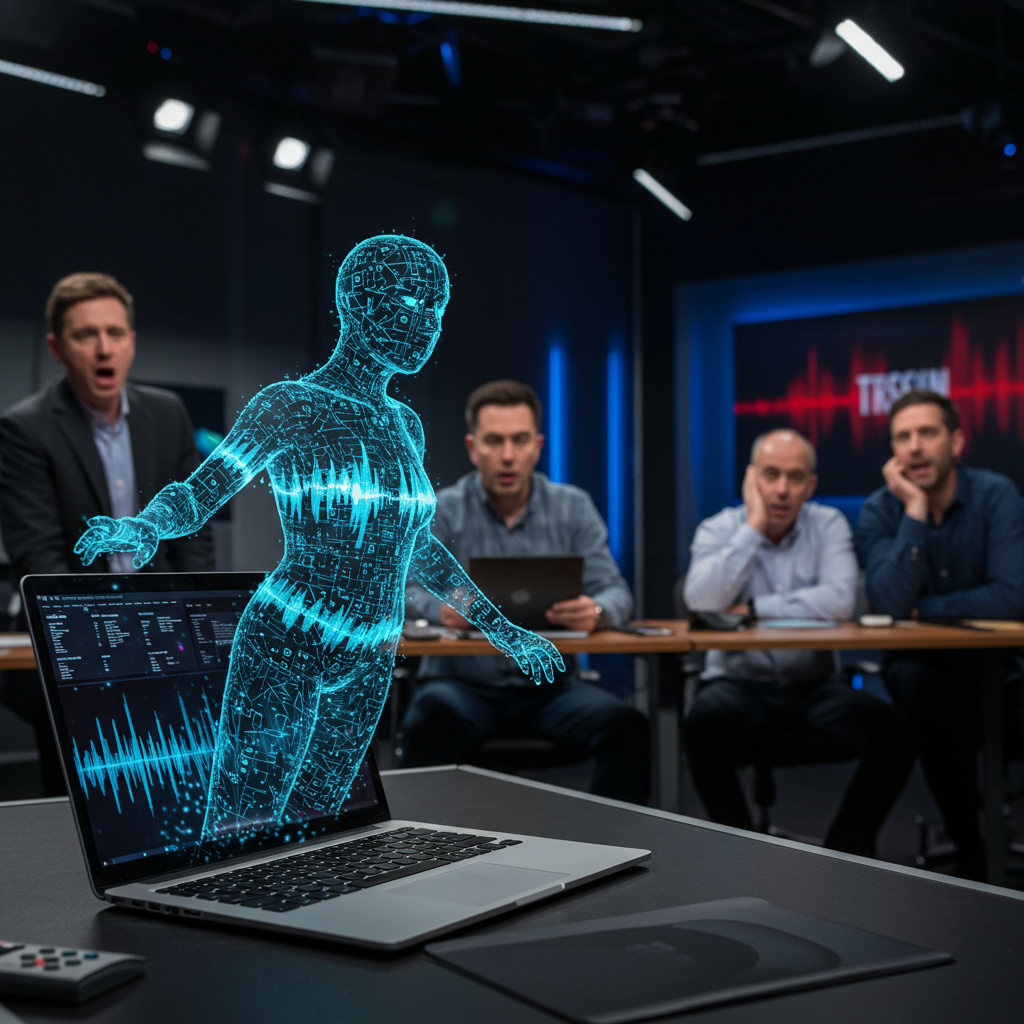The music world is buzzing about a perplexing mystery: the sudden rise of a band called The velvet sundown. In just a few weeks, their tracks have racked up hundreds of thousands of streams on major platforms like Spotify. Despite this viral success and a verified Spotify page boasting over 850,000 monthly listeners, virtually nothing is known about the four musicians supposedly behind the project.
This profound lack of public presence is highly unusual for a popular act. There are no recorded interviews with band members. They appear to lack individual social media profiles. Crucially, there are no reports or records of any live performances ever taking place.
The AI Accusations Emerge
The silence from the band’s side quickly fueled speculation: could The Velvet Sundown and their music actually be generated by artificial intelligence? This question has become a central point of debate among listeners and industry observers alike. The band itself has used social media platforms to deny claims that they are AI-generated.
However, their denial hasn’t been accompanied by transparency. The BBC reached out to the band for an interview request, but received no response. This continued lack of engagement only deepened the mystery and the suspicion.
A Baffling Spokesman Hoax Adds Confusion
Adding another layer of bizarre complexity to the saga was a strange episode involving a supposed band representative. Initially, Rolling Stone US reported that a spokesman for The Velvet Sundown had confessed the music was created using an AI tool called Suno. This admission sent shockwaves through the industry.
Yet, the story took another twist almost immediately. Rolling Stone soon issued a follow-up report, revealing that the supposed spokesman was himself a hoax. This individual, who identified himself as Andrew Frelon, later claimed his entire interaction was a deliberate ploy to deceive the media. The band has since released a statement via their Spotify page. It explicitly denies any association with this individual. They even stated they had no evidence confirming his identity or existence. Furthermore, the band disowned an account on platform X. They stated this channel, which claimed to be their official presence, was also fake.
Analyzing the Sound: Human or Machine?
So, what does the music itself sound like? The Velvet Sundown’s output consists primarily of indie ballads. These tracks feature guitar music and male vocals. Listeners have described the sound as relatively easy on the ear, if perhaps a little bland.
The lyrics accompanying the music are equally ambiguous. Lines such as “eyes like film in faded light, dreams walk barefoot into the night” or “ash and velvet, smoke and flame, calling out in freedom’s name” could plausibly have been written by a human songwriter. However, they could just as easily have been generated by a sophisticated AI lyric generator. This ambiguity does little to settle the central question.
Technology Weighs In
While human listeners debate, technology itself has offered an opinion. Deezer, a rival music streaming platform, reportedly ran The Velvet Sundown’s tracks through its own AI detection tool. The result? The tool flagged the music as being “100% AI generated.” This finding provides technical backing for the AI suspicions, though the methodology and reliability of such tools are still evolving.
Spotify, the platform where the band achieved viral success, did not comment directly on The Velvet Sundown case when asked. However, Spotify CEO Daniel Ek has previously shared his stance on AI music. He stated he does not plan to ban AI-generated music from the platform entirely. Despite this, he added that he disagrees with using the technology specifically to mimic the work or style of real human artists.
Shaky Reality and Online Authenticity
The mystery surrounding The Velvet Sundown extends beyond the music itself. It highlights a broader societal challenge. Professor Gina Neff from the University of Cambridge notes that whether this specific band is AI or not might seem minor on the surface. However, she argues it points to a significant issue affecting our collective grip on reality. The Velvet Sundown story plays directly into growing anxieties about losing control over artificial intelligence. It underscores just how critical it is to protect accurate information online.
This concern about discerning reality from fabrication is increasingly relevant in the digital age. For instance, identifying fake AI-generated images has become a growing challenge. Experts point out that while these images can look “hyper-real,” closer inspection often reveals tell-tale signs. Distorted or unnatural body parts, particularly hands with too many or too few fingers, are common giveaways. Unnatural facial features, waxy skin tones, or blurry areas where they shouldn’t be can also indicate AI manipulation. Even eye direction can appear inconsistent with the depicted action. Beyond visual cues, cross-referencing information with trusted news sources and considering the context and motive of the person sharing content are crucial steps in verifying online authenticity. The speed and sophistication of AI-driven synthetic content technology are advancing rapidly, making it harder to distinguish between genuine and fake material.
The Music Industry’s Mounting Concerns
For many within the creative arts, particularly the music industry, the implications of AI are a source of deep concern. The Velvet Sundown case crystallizes fears about AI potentially displacing human artists. Hundreds of musicians have actively protested the use of their existing work. They worry that their content is being used without permission to train AI models that then create new music.
Efforts have been made to address these concerns legally and politically. High-profile artists like Sir Elton John and Dua Lipa joined members of the UK’s House of Lords in advocating for new laws. They pushed for the UK government to specifically include AI and copyright protections within new legislation regarding data use and access. Ultimately, their campaign was unsuccessful in immediately embedding these protections into the new laws. The government has stated it is conducting a separate consultation specifically on the complex issues of AI and copyright.
Theft Dressed as Competition?
Industry advocates argue that scenarios like The Velvet Sundown validate their worst fears. Ed Newton Rex, founder of Fairly Trained, an organization campaigning for AI firms to respect creators’ rights, has voiced strong opinions. He believes this situation is exactly what artists have been worried about. He describes it starkly as “theft dressed up as competition.” His argument is that AI companies utilize artists’ work to build their generative products. Then, they flood the market with AI-created “knock-offs.” This ultimately reduces the potential income and opportunities available for human musicians.
Sophie Jones, the chief strategy officer at BPI (British Phonographic Industry), echoes these sentiments. She states that the ongoing discussion surrounding The Velvet Sundown reinforces many of the concerns the music industry and artist community have raised in recent months. These concerns center on the critical issues surrounding AI and music rights. The case highlights, in her view, the urgent need for government action and updated regulatory frameworks.
The rise of AI technology is attracting massive investment and reshaping strategic priorities across many industries. For example, major tech companies are pouring billions into AI development and infrastructure. Microsoft alone has invested heavily in large data centers needed for AI training and refocused its business strategically towards AI capabilities. They have even hired leading AI pioneers to head new divisions. This push involves significant financial incentives to attract top AI talent, with reports of enormous bonuses being offered by competitors like Meta. Leaders in the tech space anticipate that AI will eventually automate or replace certain roles. This backdrop of rapid AI advancement and investment shows the scale of the technological shift. However, the Velvet Sundown case demonstrates the disruptive potential and ethical challenges this shift poses specifically to creative fields and the fundamental concept of authorship.
Frequently Asked Questions
What is the mystery surrounding the band The Velvet Sundown?
The Velvet Sundown gained significant popularity on streaming platforms like Spotify, accumulating millions of plays and monthly listeners very quickly. The mystery stems from the complete lack of public information about the band members; they have no known interviews, social media accounts, or live performances, leading to widespread speculation that they might be AI-generated.
How did The Velvet Sundown’s music get flagged as potentially AI-generated?
Beyond the lack of public human presence, the ambiguity of the music’s style and lyrics contributed to the suspicion. Most notably, rival streaming platform Deezer reported using its AI detection tool on The Velvet Sundown’s tracks, which flagged the music as being “100% AI generated,” providing a technical basis for the claims, despite the band’s denials.
What are the main concerns raised by the music industry about AI music like the Velvet Sundown case?
The primary concerns involve potential displacement of human artists, the use of existing music to train AI models without permission (“theft dressed up as competition”), and the flooding of the market with AI-generated content that could reduce income for human musicians. The case highlights issues of copyright, online authenticity, and the perceived need for updated regulations to protect creators’ rights in the age of AI.
Conclusion
The story of The Velvet Sundown is more than just a music industry oddity; it’s a symptom of a rapidly changing digital landscape shaped by artificial intelligence. Whether the band is ultimately human or AI-generated, or the product of a complex hoax, the case has forced a critical conversation about creativity, authenticity, and the future of art in the age of powerful new technologies. As AI continues to advance and become more integrated into our lives, determining what is real and protecting the work of human creators will remain significant challenges, underscoring the importance of vigilance and robust legal frameworks.




